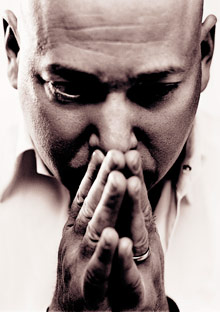My Philosophical Noncommitment

Photo: Mackenzie Stroh
Doctors told him he wouldn't live and that he'd never have children. Twenty-two years later, still very much alive and the father of a 1-year-old, Sex and the City star Evan Handler answers the big questions about life, death, faith, and religion with three simple words.
When I was 24 years old, I was diagnosed with acute myeloid leukemia and told it was "incurable." But instead of dying, as I was led to expect I would, I am now considered to be long cured—and I'm almost finished being 46. Thanks to my history of illness and unexpected recovery, I started getting asked my views on complex issues when I was only about 25. That's a young age for philosophizing about life and death, even for a theologian. Me, I'm an actor. The questions came from friends and mere acquaintances. The inquisitors might be my age, or two or three generations older. "Do you think things happen for a reason?" they'd ask. "Can you alter your destiny? Does prayer work? Do you believe life has a meaning? Is there a higher power?" I don't know.
A very common question, when I was a kid, was whether or not you believed in God. It came up all the time, and it was used as a kind of introductory identity test—sort of the 9-year-old's equivalent of asking somebody at a cocktail party what they do for a living. The questions flew in quick succession to several other standards.
"What religion are you?" "Yankees or Mets?" "How long can you hold your breath?" "Do you believe in God?"
I've always had an odd relationship to that last question. For me, the answer is straightforward and inevitable. I don't know. I don't mean that as a cop-out from contemplation. I've tried to live my life from a position of being open to all possibilities, with great curiosity and wonder about what, to me, can never be known. To the possibility that there is meaning beyond what's easily seen; to the possibility that there's not. To the possibility that there is some form of intelligence guiding the intricate systems that sustain us, and to the possibility that there isn't. But if you're going to ask me what I think the situation is, when I close my eyes at night and dream, wondering if I'll get to wake up again, or if it matters whether I do, then you'll hear what, to me, is the most sensible refrain: I don't know.
Still, I am fascinated by our conundrum as humans living on planet Earth. I've said to friends, probably more times than they've wanted to hear, "We live in outer space. Can you believe it? We live in outer space." It's a crucial thing to remind myself, because it justifies my choice to remain committed to philosophical noncommitment. We don't know where we live. As many maps as have been produced, with all the stellar observations and radio frequency surveillance, we have no idea what substance contains us, where it came from or where it's headed, if it has a purpose or what it might be, how it started, or how long it will last. The most advanced of our species are, in relation to the universe beyond our planet, identical to tribes that have no conception of the world beyond their rainforest.
My favorite argument in favor of a guiding force came from my brother when I was 17. I was involved in my first sexual relationship with my first requited love, Kathleen. When somehow the topic came up, my brother declared, "Of course there's a God, Evan. Why do you think your thing fits inside hers? You think that's an accident?" Now, that gave me pause.
But I've remained a fairly "I don't know" guy. Not in the passive, desultory manner most would imagine. It's a conscious, emphatic decision to remain undecided.
I once heard a story told by a songwriter who'd had a new song criticized by a peer. "He hated it," the musician said. "Hated it! He told me he thought it was maudlin and sentimental." The songwriter's reply was splendid. "Well," he said, "all I can tell you is that it came from an extremely heartfelt place."



